新概念英语1Lesson85
(完整版)新概念英语第一册lesson85-86重点解析
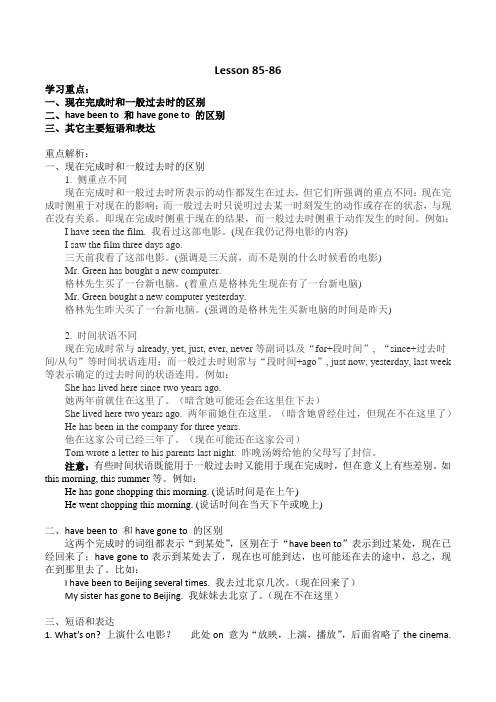
Lesson 85-86学习重点:一、现在完成时和一般过去时的区别二、have been to 和have gone to 的区别三、其它主要短语和表达重点解析:一、现在完成时和一般过去时的区别1. 侧重点不同现在完成时和一般过去时所表示的动作都发生在过去,但它们所强调的重点不同:现在完成时侧重于对现在的影响;而一般过去时只说明过去某一时刻发生的动作或存在的状态,与现在没有关系。
即现在完成时侧重于现在的结果,而一般过去时侧重于动作发生的时间。
例如:I have seen the film. 我看过这部电影。
(现在我仍记得电影的内容)I saw the film three days ago.三天前我看了这部电影。
(强调是三天前,而不是别的什么时候看的电影)Mr. Green has bought a new computer.格林先生买了一台新电脑。
(着重点是格林先生现在有了一台新电脑)Mr. Green bought a new computer yesterday.格林先生昨天买了一台新电脑。
(强调的是格林先生买新电脑的时间是昨天)2. 时间状语不同现在完成时常与already, yet, just, ever, never等副词以及“for+段时间”, “since+过去时间/从句”等时间状语连用;而一般过去时则常与“段时间+ago”, just now, yesterday, last week 等表示确定的过去时间的状语连用。
例如:She has lived here since two years ago.她两年前就住在这里了。
(暗含她可能还会在这里住下去)She lived here two years ago. 两年前她住在这里。
(暗含她曾经住过,但现在不在这里了)He has been in the company for three years.他在这家公司已经三年了。
(现在可能还在这家公司)Tom wrote a letter to his parents last night. 昨晚汤姆给他的父母写了封信。
新概念一Lesson85-86讲解与习题
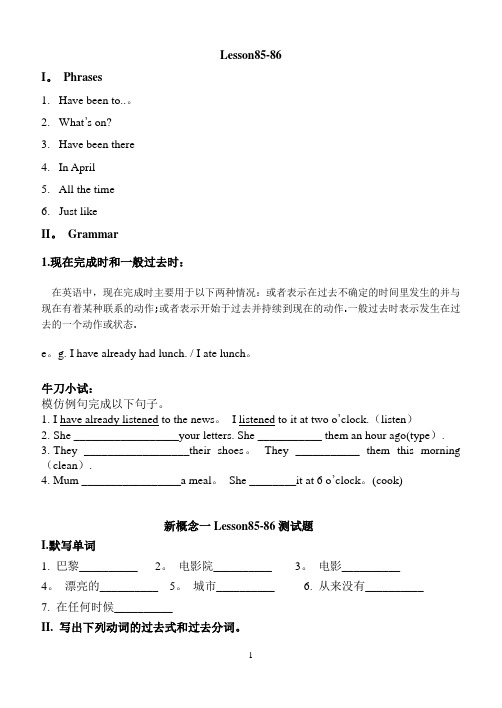
Lesson85-86I。
Phrases1.Have been to..。
2.What’s on?3.Have been there4.In April5.All the time6.Just likeII。
Grammar1.现在完成时和一般过去时:在英语中,现在完成时主要用于以下两种情况:或者表示在过去不确定的时间里发生的并与现在有着某种联系的动作;或者表示开始于过去并持续到现在的动作.一般过去时表示发生在过去的一个动作或状态.e。
g. I have already had lunch. / I ate lunch。
牛刀小试:模仿例句完成以下句子。
1.I have already listened to the news。
I listened to it at two o’clock.(listen)2.She __________________your letters. She ___________ them an hour ago(type).3.They __________________their shoes。
They ___________ them this morning (clean).4.Mum _________________a meal。
She ________it at 6 o’clock。
(cook)新概念一Lesson85-86测试题I.默写单词1. 巴黎__________ 2。
电影院__________ 3。
电影__________4。
漂亮的__________ 5。
城市__________ 6. 从来没有__________7. 在任何时候__________II. 写出下列动词的过去式和过去分词。
1.buy _________ _________2.do _________ _________3.have _________ _________4.see _________ _________5.open _________ _________6.air _________ _________7.ask_________ _________8.put_________ _________9.go_________ _________10.be_________ _________III. 按要求改写句子1.I have just been to the cinema. (改为一般疑问句并作肯定回答)2。
新概念英语第一册Lesson85-86经典
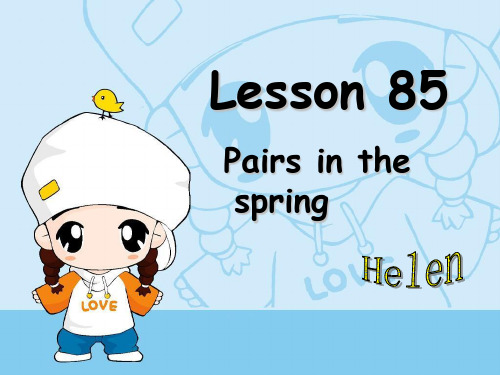
Lesson 85 Paris in thespring
★ beNaeuwtifuwl oarddj.s漂a亮nd的expressions:
① 美丽的,使生美感的 • She was even more beautiful than I had expected.
她甚至比我预期的还要美。 ② adj. 出色的,完美的;令人愉悦的 • He did a beautiful job of painting the desk.
yesterday,
时
事,不强调 对现在的影 响
was/were, did
last---, ---ago, after---
I was there last month. I went to Paris last year.
现在完成 过去发生的 have/has+
时
事对现在的 过去分词
影响,或从
过去一直持
仿照例句: 他从来没有去过北京。 He has never been to Beijing. 你以前去过北京吗? Have you ever been to Beijing?
GEORGE: Pairs in the spring, eh?
KEN:
It was spring, but the weather
B:Oh, Mum. I have____finished my homework.
A. yet
B. ever C. already D. never
( A.
)a3m. I_g_o_inaghotolidhaayvDenexBt .mhoanvethh. ad
C. have
D. had
( )4. A: Have you___your lunch?
新概念第一册lesson85-86 Paris in the spring幻灯片课件

Have you just been to the cinema? 你刚刚去过电影院吗? 这是一个现在完成时态的一般疑问句。
just : 刚刚,刚才,现在完成时态的标志 词之一
Have you just been to the cinema? 把这句话变为肯定句: I have just been to the cinema. 你刚刚去了电影院。
I was there last month. I went to Paris last year.
现在完成 时
过去发生的 事对现在的 影响,或从 过去一直持 续到现在的 动作或状态
have/has +过去分词
already, just (肯定句中); never(肯定句 中表否定); ever(疑问句中)
Lesson 85-86 Paris in the spring
1. PCahreicsk /'pæ ris/ n. P巴hon黎etics
2. cinema /'sinimə/ n. 电影院
3. film /film/ n. 电影
4. beautiful /'bjVuo:ctaibfuulal/ry adj. 漂亮的
• Yes,he did.
• 4.At At what time of year did Ken visit Paris?
• He was there in April.
• 5.What’ s the weather like in Paris in spring?
• The weather was awful.
I have already read this book. I read it yesterday. It’s an old book, but it’s interesting.
新概念英语成人版第一册Lesson85-86导学案含答案

Lesson 85 ~ 86 Paris in the spring◆词汇详解(1) Paris n. 巴黎巴黎圣母院凡尔赛宫凯旋门卢浮宫塞纳河畔‘Paris in the Spring’:电影《巴黎之春》(2) cinema n. 电影院近义词:____________去看电影____________________________(3) film n. 电影同义词:______________(4) beautiful adj. 漂亮的e.g. 她是个漂亮的女孩儿。
___________________________________________.e.g. Beautiful weather, isn't it?_____________________,对吗?(5) city n. 城市扩展:国家___________ / 村庄___________ / 城镇_________ / province省(6) never adv. 从来没有e.g. -- I’m sorry. I forgot my homework.-- Never mind. ____________。
✍试一试:他周末从来不早起。
____________________________________________.I have never been to France. __________________________________。
(7) ever adv. 在任何时候ever常用于否定句、疑问句以及表示条件的从句中表示“以往任何时候”、“曾经”、“在任何时候”、“从来”这类意思,用在句中通常有________之意。
e.g. 你(曾经)去过北京吗?_______________________________________________________?(1) Have you just been to the cinema?●复习回顾前面83课我们学到的现在完成时。
新概念英语第一册85课
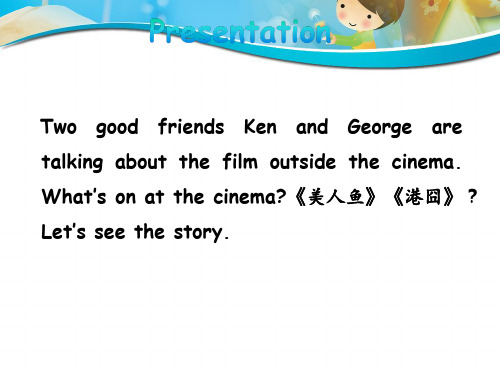
活到老,学到老。 One is never too old to learn.
Lesson 85 Paris in the spring
George: Hollo, Ken.
Ken:
Hi, George.
George: Have just been to the cinema?
Ken: Yes, I have.
It rained all the time.
all the time 一直,始终
George: Just like London!
就
介词“像”
Just like London! = The weather in Paris in spring is just like the weather in London in spring. 这里的just是“就、正好、恰恰”的意思。 【比较上文】 这里的like是“像”的意思。 酒店就像家一样。 The hotel is just like home. 夏威夷就像天堂一样。 Hawai is just like heaven.
Lesson 85 Pairs in the spring
GEORGE: Hello, Ken. KEN: Hi, Georen. GEORGE : Haveyou just been to the cinema? KEN: Yes, I have. GEORGE : What’s on? KEN: “Paris in the Spring”. GEORGE: Oh, I’ve already seen it. I saw it on television last year. It’s an old film, but it's very good. KEN: Paris is a beautiful city. GEORGE: I've never been there.Have you ever been there,Ken? KEN: Yes, I have.I was there in April. GEORGE: Paris in the spring,eh? KEN:It was spring,but the weather was awful.It rained all the time . GEORGE: Just like London!
新概念英语单词第1册Lesson85: Paris in the spring

新概念英语单词第1册Lesson85: Paris in thespringParis ['prs] n. 巴黎cinema ['snm] n. 电影院【单词扩充】poster海报movie star电影明星【单词搭配】go to the cinema看电影【单词例句】A: Would you like to go to the cinema with me tonight?A:今晚跟我一起去看电影吧?B: What is on this evening?B:今天晚上演什么片啊?film [film] n.电影【单词扩充】plot情节【单词搭配】horror film恐怖片 comedy film喜剧片【单词例句】A:I like interesting films.A:我喜欢有趣的影片。
B:I like the films which are significant.B:我喜欢比较有意义的影片。
beautiful ['bjutf()l] adj.漂亮的【派生词】beautifully漂亮地【单词扩充】handsome溧亮的 good-looking漂亮的,美貌的【反义词】ugly难看的【单词例句】A:Would you show me that beautiful bonnet?A:把那顶漂亮的软绒帽拿给我看看好吗?B:Do you mean the red one?B:你是说那顶红色的吗?city ['st] n. 城市never ['nev] adv. 从来没有ever ['ev] adv.在任何时候。
新概念英语第一册自学笔记含课后练习答案:Lesson 85-86
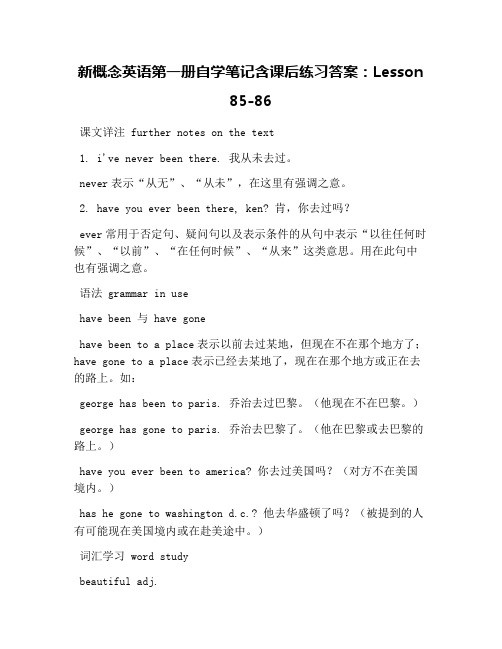
新概念英语第一册自学笔记含课后练习答案:Lesson85-86课文详注 further notes on the text1. i've never been there. 我从未去过。
never表示“从无”、“从未”,在这里有强调之意。
2. have you ever been there, ken? 肯,你去过吗?ever常用于否定句、疑问句以及表示条件的从句中表示“以往任何时候”、“以前”、“在任何时候”、“从来”这类意思。
用在此句中也有强调之意。
语法 grammar in usehave been 与 have gonehave been to a place表示以前去过某地,但现在不在那个地方了;have gone to a place表示已经去某地了,现在在那个地方或正在去的路上。
如:george has been to paris. 乔治去过巴黎。
(他现在不在巴黎。
)george has gone to paris. 乔治去巴黎了。
(他在巴黎或去巴黎的路上。
)have you ever been to america? 你去过美国吗?(对方不在美国境内。
)has he gone to washington d.c.? 他去华盛顿了吗?(被提到的人有可能现在美国境内或在赴美途中。
)词汇学习 word studybeautiful adj.(1)美丽的,使生美感的:she was even more beautiful than i had expected. 她甚至比我预期的还要美。
she's a girl with a beautiful voice. 她是一位嗓音美妙动听的姑娘。
(2)出色的,完美的;令人愉悦的:her french is as beautiful as her english. 她的发文说得和英文一样漂亮。
he did a beautiful job of painting the desk. 他油漆了书桌,活干得很漂亮。
- 1、下载文档前请自行甄别文档内容的完整性,平台不提供额外的编辑、内容补充、找答案等附加服务。
- 2、"仅部分预览"的文档,不可在线预览部分如存在完整性等问题,可反馈申请退款(可完整预览的文档不适用该条件!)。
- 3、如文档侵犯您的权益,请联系客服反馈,我们会尽快为您处理(人工客服工作时间:9:00-18:30)。
时态
用法
动词形式
时间状语 标志词
例句
一般现在 一般,经 原形/三单 am/is /are; 时 常,习惯, dodoes 真理 一般过去 过去发生 的事,不 时
every day, I often read always, books. usually, often, He likes music sometimes,
GEORGE: What's on? ———— KEN: 'Paris in the spring'. GEORGE: Oh, I've already seen it. I saw it on television last year. be on 是上演的意思, It's an old film, 也可理解成在荧幕上 but it's very good.
现在完成时 (1)在英语中,现在完成时表示过去发 生的事情对现在的影响。 (2)构成:have/has+ 过去分词,单 数第三人称用has,其他人称皆用have。 (3)一般现在完成时通常与表示不确定 的时间副词或短语连用如 just, already,
before, never, ever, twice, three times 等。 4)现在完成时在汉语中常用“了”、
written exercises A ema n. 电影院 film n. 电影;胶卷 beautiful adj. 漂亮的 city n. 城市 never adv. 从来没有 ever adv. 在任何时候 G/P:have /has been to have /has gone to
At what time of year did Ken visit Paris?
GEORGE: Hello, Ken. just刚刚,刚才 KEN: Hi, George. GEORGE: Have you just been to the cinema? KEN: Yes, I have.
have/has been to 去过已回 have/has gone to 去了未回
现在完成 过去发生 的事对现 时
在的影响, 或从过去 一直持续 到现在的 动作或状 态
have/has +过去分词
already, just (肯定句中); never(肯定句 中表否定); ever(疑问句中)
Have you ever been to the bird nest?
Have you ever been to the disneyland?
in spring / summer / autumn / winter 在季节前 不用加任何冠词‘Paris in the spring这指的是一个春 天在巴黎发生的事情,所以 加了定冠词
KEN: Paris is a beautiful city. GEORGE: I've never been there. Have you ever been there, Ken? KEN: Yes, I have. I was there in April. in April 月份前面不用冠词 never与ever都是完成时的标 志词,but never通常用于陈 述句中,表示绝不,从来没有, 而ever通常用于疑问句中,表 示曾经,在任何时候
Homework
1.朗读背诵85课给家长听; 2.抄写85-86课单词每个1遍,翻译1遍,默1遍 完成课后86课课后练习; 3.听并默写第85课; 4.做力所能及的事,家长签字评语。
Have you ever been to Xi’an Qinling Zooloigical Park?
Have you ever been to the Great Wall?
Have they ever been to the space?
Has she ever been to an amusement park?
Have you ever been to …? Yes , I have ./No , I haven’t. Has he /she ever been to …? Yes, he /she has./No,he /she hasn’t. Me, neither.
Lesson 86 What have you done?
GEORGE: Pairs in the spring, eh? KEN: It was spring, but the weather was awful. It rained all the time. GEORGE: Just like London!
all the time 一直,始终 just是就,正好, 恰恰的意思。 like是像的意思 awful糟糕的, 讨人厌的
强调对现 在的影响
yesterday, 过去式 was/were, last---, ---ago, did after---
I was there last month. I went to Paris last year.
I have already been to Paris. I have just been there. I have never been there. have
“过”或“已经”来表示。
Paris ['pæ ris] n.巴黎 cinema ['sinəmə] n.电影院 film [film] n. 电影 beautiful ['bju:tiful] adj. 漂亮的 city ['siti] n. 城市 never ['nevə] adv. 从来没有 ever ['evə] adv. 在任何时候
Miss Yang
Has he ever been to the …?
aquarium
aquarium
Has she ever been to the space museum
water park to Has he ever been
the water park?
Make up a short conversation
